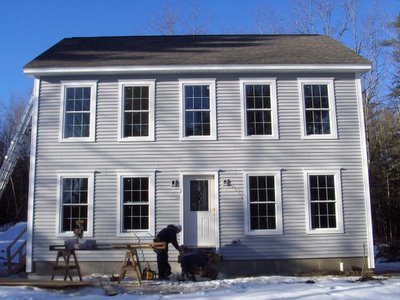I never read Tolkien as a kid. My sister did though. I remember seeing
The Hobbit on her bedroom floor once and noticing the dragon on the cover I asked her about it. She said something to the effect that it was a challenging read that I might be someday worthy of. Needless to say, I put off J.R.R.T until the Fellowship of the Ring hit the theatres. I watched the movie and wast totally gripped. Within a week I got my hands on the original sources. Immediately, my wife, Heidi, and I read through
The Lord of the Rings, aloud together. It was a blast! Almost every night, we'd spend an hour or two (sometimes even more!) caught up in the drama, wondering what would happen next.
Our journeys into Middle Earth continued for months. One day, I became big-time convicted that I was more captivated by the drama of Tolkien than the drama of Scripture. In an amazing way, reading Tolkien introduced me to the significance of Biblical Theology. As great as it was (and continues to be) to travel alongside of Frodo throughout Middle Earth, it is earth-shattering to realize that I have a role in the Drama of Scripture. I, too am caught up in a epic drama of God's Creation, Humanity's Rebellion, and the Messiah's Redemption. The story Frodo and Sam found themselves in didn't begin at Biblo's one hundred and eleventieth birthday party. It goes way back to Illuvatar's creation of Arda (earth), the rebellion of Melkor, the arrival of elves and men, the forging of the Silmaril jewels and the wars that ensued. The complexity and unity of the Tolkien's story helped reveal the amazing story that Scripture describes.
The following quote describes the "Aha!" moment I experienced several years ago, when, like Samwise Gamgee, it dawned on me that I belong to a much larger story than I ever imagined.
‘I don’t like anything here at all,’ said Frodo, ‘step or stone, breath or bone. Earth, air and water all seem accursed. But so our path is laid.’
‘Yes, that’s so, said Sam. ‘And we shouldn’t be here at all, if we’d known more about it before we started. But I suppose it’s often that way. The brave things in the old tales and songs, Mr. Frodo: adventures, as I used to call them. I used to think that they were things the wonderful folk of the stories went out and looked for, because they wanted them, because they were exciting and life was a bit dull, akind of a sport as you might say. But that’s not the way of it with the tales that really mattered, or the ones that stay in the mind. Folk seem to have been just landed in them, usually—their paths were laid that way, as you put it. But I expect they had lots of chances, like us, of turning back, only they didn’t. And if they had, we shouldn’t know, because they’d have been forgotten. We hear about those as just went on—and not all to a good end, mind you; at least not to what folk inside a story and not outside it call a good end. You know, coming home, and finding things all right, though not quite the same—like old Mr. Bilbo. But those aren’t always the best tales to hear, though they may be the best tales to get landed in! I wonder what sort of a tale we’ve fallen into?’
‘I wonder,’ said Frodo. ‘But I don’t know. And that’s the way of a real tale. Take anyone that you’re fond of. You may know, or guess, what kind of a tale it is, happy-ending or sad-ending, but the people in it don’t know. And you don’t want them to.’
‘No, sir, of course not. Beren now, he never thought he was going to get that Silmaril form the Iron Crown in Thangorodrim, and yet he did, and that was a worse place and a blacker danger than ours. But that’s a long tale of course, and goes on past the happiness and into grief and beyond it—and the Silmaril went on and came to Earendil. And why, sir, I never thought of that before! We’ve got—you’ve got some of the light of it in that star-glass that the Lady gave you! Why to think of it, we’re in the same tale still! It’s going on. Don’t the greatest tales never end?’
J.R.R. Tolkien, The Lord of the Rings 50th Anniversary Edition (New York: Houghton Mifflin, 2004), p. 711-712.














